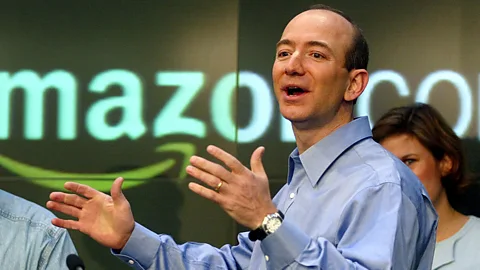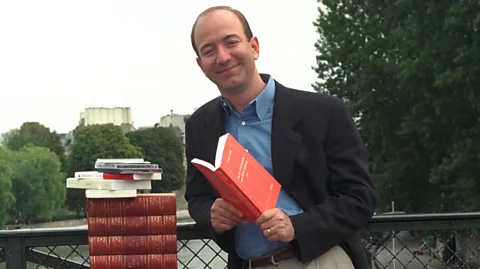 Getty Images
Getty ImagesAmazon was once Jeff Bezos’s “famously unprofitable company”, as the former CEO said in an exclusive 2000 BBC Newsnight interview. Nearly 25 years on, the ubiquitous company has become one of a handful of companies in the world valued at over $2 trillion.
On 8 June 2000, the BBC presenter Jeremy Vine was pictured sat behind the Newsnight desk, poring over a report on a seemingly flailing ecommerce market. Sitting across the table from him was that night’s guest: 36-year-old Jeff Bezos, the CEO of Amazon.com, Inc.
At the time of the interview on the BBC’s flagship current affairs programme, Amazon had reached a pivotal point in its history. By mid-2000, the dotcom boom had created an economic bubble that began to reach its bursting point. Dozens of online businesses, including Amazon, which hovered near the gravitational centre of the dotcom bubble, were starting to feel its impact.
While Amazon garnered $1.6bn (£1.27bn) in sales in 1999, it also suffered net losses of $720m (£567m), as Vine highlighted in his Newsnight report, and the company’s share price was volatile, dropping from $113 a share in December 1999 to $52 in June 2000.
“People used to say Amazon is ‘amazing,'” said Vine, launching into the interview. “And now they say: ‘isn’t it amazing that Amazon is losing so much money?'”
“Well, we are a famously unprofitable company,” Bezos responded, largely unfazed. “And that is a conscious strategy and an investment decision.”
Twenty-four years after the interview, and 30 years after Amazon’s start, Vine can still remember many aspects of the interview – and Bezos. “I had some hostile questions,” Vine tells In History. “And he just batted them away. Never, ever broke a sweat, literally.”
“I do remember thinking: ‘this guy is quite a happy soul’,” says Vine. “He just had a spring in his step, and I, looking back on it – I’ve always thought he already knew at that point that he was going to be the richest man on Earth.”
The ecommerce fairytale
Jeff Bezos founded the company on 5 July 1994 in a garage in Bellevue, Washington, with the site launching a year later. The worldwide web was still in its infancy (known as Web 1.0), and only a few companies had begun to see the potential of web-based businesses. Amazon started out as an online bookseller, touting the world’s largest collection of ebooks at the time, as vast as the eponymous river it was named after, and doubled down on books to become a central player in the burgeoning ecommerce market.
Amazon rode on the wave of the dotcom boom, a rapid rise in the US technology sector in the latter half of the late 1990s instigated by significant market investments that birthed a generation of new internet-based companies.
 Getty Images
Getty ImagesFour years after the site’s launch, Amazon became the biggest online sales platform in the world, expanding its offerings to other goods, such as electronics, toys and appliances. By the end of the millennium, Amazon had 17 million customers and its valuation skyrocketed to 50 times its IPO value. Jeff Bezos was even named the 1999 Person of the Year by Time Magazine, who labelled him the “king of cybercommerce”.
In the years since, however, the company has faced criticism over its tax and labour practices. And even in 2000, despite Amazon’s meteoric success, some people had their doubts about the company. On Newsnight in 2000, the Amazon founder embraced the quips critics made about his company, like “Amazon-dot-con”, “Amazon-dot-bomb” and his personal favourite, “Amazon-dot-org”, alluding to its difficulty in making a profit.
“To lose money when you’ve got 20 million customers takes real skill,” Vine remarked, earning one of Bezos’s signature chortles.
“Well, we have that,” Bezos replied jokingly, before fading to a more tempered demeanour. “But what’s really going on here is we’re investing.”
Amid the turmoil of instability in the dotcom and ecommerce space, Bezos was already thinking toward expansion. In 1999, Amazon invested about four million sq ft of distribution around the world, including two million sq ft into the company’s largest distribution centre in the UK, just outside of London. Adopting a strategy, according to Bezos, of “offering a wide selection of products for as little cost as possible” also contributed to the company’s losses at time. But the main priority was to fulfil Amazon’s ever-growing customer demand, Bezos said in 2000.
Bezos astutely leaned into the company’s losses to gain future traction in the market. Though the company was hit hard by the eventual dotcom crash, its forward-facing, customer-first strategy helped Amazon escape the harshest effects.
“I just remember, as [Bezos] left the studio, sort of watching him go and thinking ‘what is lying ahead for that guy?'” Vine says in 2024. “He had just avoided the worst of it. The dotcom bubble was very bad, and it predated the whole banking crash [of 2007]. It was a bad scene. A lot of people lost their trousers.”
Amazon, which made $574.8 bn (£452.2 bn) in net sales revenue in 2023, has also branched out to other pursuits beyond its intricate retail universe, including a film and television studio, a streaming service, full-service grocery stores and AI assistant technology. The company also acquired and incorporated a number of companies, including Twitch Interactive, Whole Foods and Audible.
“I thought, ‘that’s why I’m not an entrepreneur’. Because by the time I got the book business up I would have thought, ‘Well, I’m doing quite well here. We can retire on this, that’s all I need to do,” says Vine today. “I was staggered that how fast [Bezos] turned [Amazon] into 2.0 and 3.0 and 4.0, to the point where now I’m getting my groceries on it.
“At the heart of it, he’s just an amazing businessman,” adds Vine. “And the incredible thing is the reach that Amazon has into our lives.”
Bezos stepped down as CEO of Amazon in 2021, passing the company to former Amazon Web Services CEO Andy Jassy. Since then, he has turned his attention to “passion projects” including his aerospace venture, Blue Origin, and The Washington Post, which he purchased in 2013.
But despite what some people might think of the man behind the company, it’s hard to ignore the extent to which Amazon has seeded its presence in most aspects of our economic existence.
For more stories and never-before-published radio scripts to your inbox, sign up to the In History newsletter, while The Essential List delivers a handpicked selection of features and insights twice a week.


